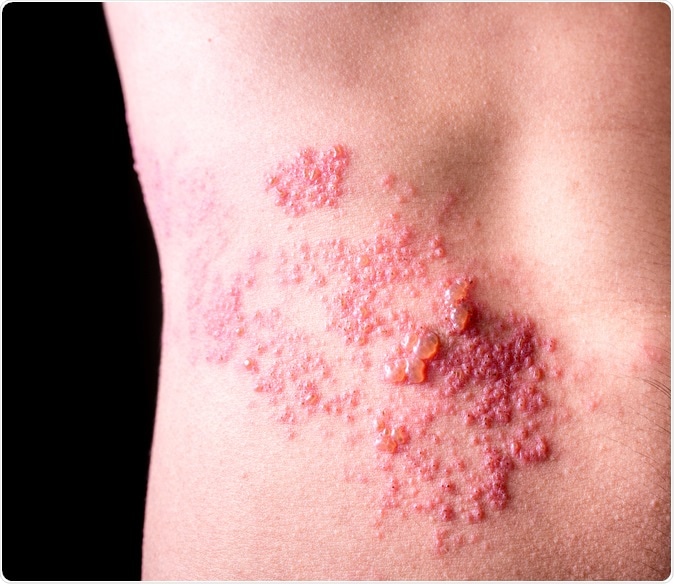Persons who have had chicken pox are prone to develop shingles with the Herpes zoster virus that lays dormant within them. A new study has shown that getting shingles - a painful skin condition caused by the virus could also raise the risk of heart disease such as heart attacks and strokes in individuals. The study was published in the Journal of the American College of Cardiology.

Raised red bumps and blisters caused by shingles on skin. Image Credit: adtapon duangnim / Shutterstock
The study conducted by a group of South Korean researchers looked at data gathered from the National Health Insurance Service’s “medical check-up” database. They found that individuals who got shingles or herpes zoster were at a greater risk for heart attack and stroke. According to Dr. Sung-Han Kim the exact cause may not be known why these two conditions are related but patients and their physicians should be aware of these findings and be aware of the increased risk.
Kim and his colleagues for this study looked at 520,000 patients and followed them up between 2003 and 2013. Within this time period, over 23,213 persons developed shingles. They compared these persons who got shingles with those who never did during the study period. These no-shingles group were considered the control group. Both groups had similar risk factors for cardiovascular diseases such as high blood pressure, diabetes, old age, high cholesterol etc. This means that the final outcome (heart attack or stroke) could occur with equal likelihood in both groups. Despite this adjustment of risk factors at the beginning of the study among the two groups, the shingles group showed an increased risk. The study also showed that most commonly shingles occurred among women, persons who smoked and drank less. The commonly seen groups of persons with shingles also exercised more and belonged to a higher socioeconomic class.
Getting shingles was linked to an increase of 59% in risk of heart attack and 35% increased risk of stroke. An increase of 41% in the risk of getting either heart attack or stroke was 41%. Stroke risk was highest below the age of 40 years and risk of both heart attack and stroke rose significantly within the first year after the onset of shingles.
Facts about shingles or herpes zoster
According to the CDC, one third of all Americans develop shingles in their lifetime. There are around a million shingles sufferers annually in USA. Persons who have had chicken pox earlier are at risk of shingles. Although children can also get shingles, older adults are more at risk.
Shingles are caused by varicella zoster virus (VZV) – the same virus that causes chicken pox. After the chicken pox infection, the virus tends to stay dormant within the body. Later in life when the person has a low immunity or is under a stressful condition – the virus reappears as a painful rash called shingles. Typically only a single episode of shingles occurs in a person’s lifetime. However a second or third episode may also be seen.
The painful rash develops on one side of the face or body forming blisters that forms scabs over a week or ten days and clears within 2 to 4 weeks. It usually stays confined to one side of the body/torso or face. Sometimes the rash may affect one eye leading to blindness in rare cases. Shingles episodes can resolve without any residual complications or may leave behind a persistent pain called post-herpetic neuralgia (PHN).
Shingles are not contagious. However the underlying virus may spread from an active shingles case to another who has never had chickenpox.
For treatment of shingles antiviral medicines such as acyclovir, valacyclovir, and famciclovir may be prescribed. They must be started as soon as possible right after the rash appears. Pain relievers may help ease the pain caused by the condition.